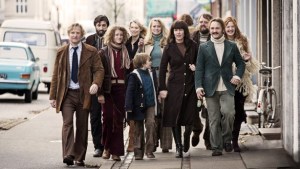Original title: ‘Kollektivet’
Denmark/Sweden/Netherlands – Drama – Year: 2016 – Running time: 111 mins
Language: Danish
Audience response following the screening of this film. Rating: 



 (3.44 from 34 returns)
(3.44 from 34 returns)
- ‘Excellent’: 6 votes
- ‘Very Good’: 12 votes
- ‘Good’: 8 votes
- ‘Satisfactory’: 7 votes
- ‘Poor’: 1 vote
Read the comments here or add you own comments on our discussion blog.
 Synopsis:
Synopsis:
The new film from Vinterberg is a change of pace from the recent Far From the Madding Crowd. He teams up with screenwriter Tobias Lindberg (A War; A Hijacking) to present the story of Erika and Anna, an academic couple, who set up a Danish commune in 1970s Copenhagen. Ideals of tolerant, socialist living are eclipsed and put to the test by an earth-shattering love affair.
…even though we learn little about most members of the commune, their characters are deftly drawn.
Geoff Andrew (Sight And Sound)
Director: Thomas Vinterberg
Far From The Madding Crowd (2015) / The Hunt (2012) / Submarino (2010)
Cast:
Ulrich Thomsen … Erik
Fares Fares … Allon
Trine Dyrholm … Anna
Helene Reingaard Neumann … Emma
Martha Sofie Wallstrøm Hansen … Freja
(for full cast, and more information, see “The Commune” in IMDB)
CFC Film Notes (Click here for print version)
Danish director Thomas Vinterberg’s own experiences of growing up in a commune during the 1970s and 80s inform his unflinching approach to the subject in this drama, based on  his own stage play, Kollektivet. The film, shot on HD digital video, has much in common thematically with Lukas Moodysson’s Together (2001), and The Idiots (1999) by fellow Dogme 95 director Lars von Trier. Some critics see The Commune as being rather more melodramatic than these earlier movies, in it’s exploration of the emotional fallout when an experiment in collective living coincides with the breakdown of a marriage.
his own stage play, Kollektivet. The film, shot on HD digital video, has much in common thematically with Lukas Moodysson’s Together (2001), and The Idiots (1999) by fellow Dogme 95 director Lars von Trier. Some critics see The Commune as being rather more melodramatic than these earlier movies, in it’s exploration of the emotional fallout when an experiment in collective living coincides with the breakdown of a marriage.
University lecturer Erik inherits a huge house on the outskirts of Copenhagen and is dissuaded from selling it by his wife, Anna, who proposes sharing the space with like-minded friends, a concept entirely alien to Erik’s way of thinking, as a means of easing the financial burden, and staving off the middle-class, middle-age ennui that threatens to engulf their marriage. Anna, a local television news reader, thrives in the hubbub of
their new living arrangement. But Erik resents the fact that his voice is no longer heard, and is flattered by attention from an attractive young student, Emma. His hand is forced when the relationship is discovered (in an agonising, finely acted scene) by his daughter, Freja. Critics have drawn attention to the performance of Martha Hansen in this role as being one of the few substantial supporting ones in the film. When Emma moves into the commune as Erik’s new partner, Anna finds herself stranded on the outside of the community. Her breakdown is bitter and undignified. Clearly the commune is emotionally fraught – is there any other kind?
Apart from Freja, Anna and Erik assemble a gallery of of hirsuite, laid-back, cigarette-smoking supporting players for their new drama of communal living: the shy, penniless Allon, who keeps bursting into tears; boozy Ole; easygoing Mona; earnest Ditte, and cuddly Steffen. They hit upon house rules, which basically means a regular meeting around the kitchen table, at which they must provide an emotional audit and say how they are “doing”. Important new decisions will be settled with a vote. At first the commune is euphoric and celebrates with a group skinny dip: a frank and funny exercise in wobbly, unsexualised nudity. But the excitement can’t last: Anna feels disoriented and marginalised by subsequent events. Can there be any point in a drama about a commune that is not torn apart with sexual tensions?
It will be interesting to learn what Chelmsford Film Club members, and guests, think of the symbolism (“broken-heart symbolism” as one critic calls it) of the chronically ill child, continually telling the adults that he hasn’t long to live!?
We always welcome audience comments for the films we show. Please join the debate here.
 Selected UK reviews:
Selected UK reviews:
The Telegraph (Tim Robey)
Time Out (Tom Huddleston)
